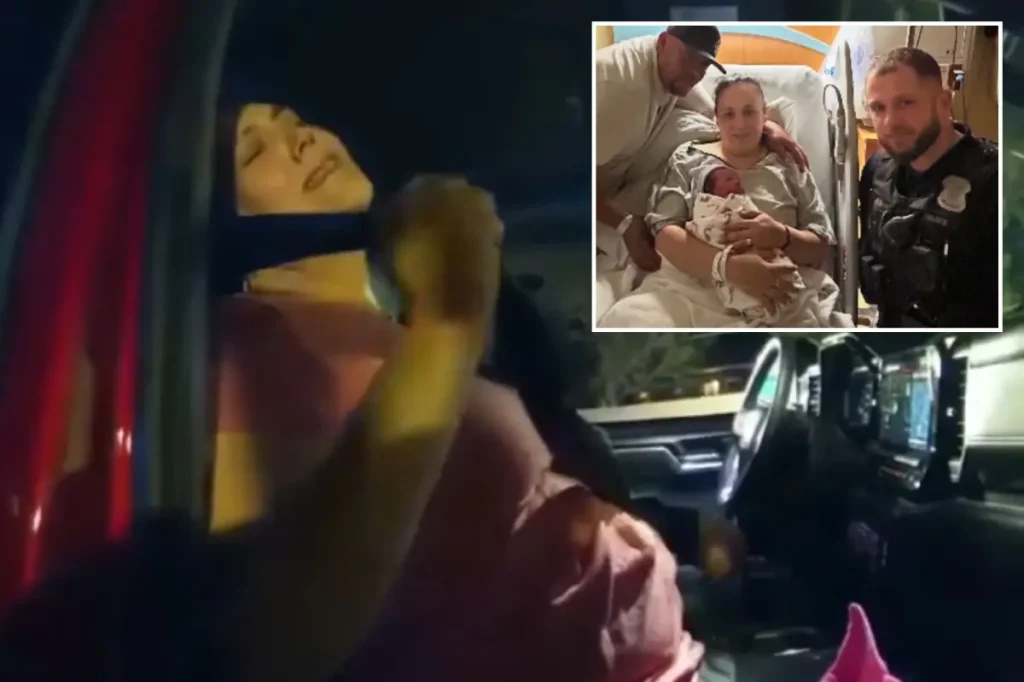A Miracle on the Roadside: The Unexpected Birth That Changed Lives
In the hustle of everyday life, extraordinary moments can occur in the most unexpected places. Such was the case in a Detroit suburb on a Saturday morning just before 2 a.m., when a routine traffic stop transformed into a miraculous delivery of new life. A 45-year-old expectant mother named Maria found herself in active labor in the passenger seat of a red pickup truck when her husband was pulled over for speeding. What followed was a heartwarming tale of quick thinking, brotherly connection, and the beautiful unpredictability of life. This story not only highlights the exceptional response of two brothers in uniform but also reminds us of the human connections that form in moments of crisis.
The scene unfolded in a parking lot nestled between a Mexican restaurant and a phone store in Melvindale, a suburb south of Dearborn, Michigan. Melvindale Police Officer Al Hasan, who had initially stopped the vehicle, quickly recognized the urgency of the situation and called for backup. Senior Officer Corporal Mohamed Hachem arrived to find Maria “breathing heavy and panicking,” clear signs that birth was imminent. With no time to wait for an ambulance, Hachem made the critical decision that the delivery would have to take place right there in the vehicle. Faced with this daunting responsibility, the young officer in his twenties—who had never had children of his own, let alone delivered one—reached out to dispatch for guidance. To his surprise and immense relief, the voice that responded belonged to his own brother, Joe Hachem, working as a dispatcher that night. “Mohamed said that calmed him down,” Interim Police Chief Christopher Egan later explained, highlighting how this unexpected family connection provided crucial emotional support during a high-pressure situation.
What transpired next was a remarkable example of teamwork across the airwaves. Joe Hachem guided his brother through each step of the delivery with precise, calm instructions: “Listen carefully, I’ll tell you exactly what to do,” he directed. “Place your hand under the baby’s head right now, and she’s coming out slowly. Continuing to stabilize, fire [department] not far out.” Following his brother’s expert guidance, Mohamed successfully delivered a baby girl in the front seat of the pickup truck. The entire incident, from traffic stop to birth, lasted only about five minutes, but it was a transformative experience for everyone involved. For Mohamed Hachem, who had been on the force for just three years, this moment went far beyond his training at the academy. Despite his lack of experience with childbirth, he maintained remarkable composure, taking instructions and acting with decisive confidence in a situation where seconds mattered.
The professionalism displayed by both brothers impressed their colleagues and superiors. Assistant Police Chief Darryl Campbell later reviewed video footage of the incident and remarked, “When I watched the video, I was very impressed. Mohamed was very calm, talked his way through it. Took instruction from someone that wasn’t there. That’s hard to do.” Shortly after the successful delivery, paramedics arrived at the scene to take over medical care. They cut the umbilical cord inside the truck before transporting both mother and newborn to the hospital. This seamless transition of care ensured that both Maria and her daughter received proper medical attention following the roadside delivery. The police department’s involvement didn’t end there, however. Officers later visited Maria and her newborn daughter, Galilea, at the hospital, forming a bond that extended beyond the unusual circumstances of their meeting.
For Maria, the experience was understandably frightening in the moment. “My fear was something is going to happen to my girl or me,” she later told local news outlet WXYZ. The vulnerability of giving birth is profound under the best circumstances; to do so in a vehicle under emergency conditions must have been terrifying. Yet the professionalism and humanity shown by the officers helped transform what could have been a traumatic experience into something more positive. Chief Egan noted that the encounter “kind of changed her perspective on law enforcement,” suggesting that beyond the successful delivery of her daughter, Maria gained a new appreciation for the officers who stepped up in her moment of need. This human connection—this bridge of understanding built through crisis—represents one of the most beautiful aspects of the story.
Since that dramatic night, Maria and baby Galilea have been discharged from the hospital and are home, beginning their lives together after their extraordinary entry into each other’s worlds. Their story serves as a powerful reminder of how unpredictable life can be, and how strangers can become forever connected through moments of crisis and triumph. The Hachem brothers performed their duties with exceptional skill, but they also did something more profound: they demonstrated the deep capacity for care that exists within public service. In a world often divided by differences, this story offers a glimpse of our shared humanity—of how, when the chips are down, people can come together across any divide to bring new life safely into the world. For the officers, the dispatcher, and especially for Maria and her family, that night in a Melvindale parking lot became not just an unusual anecdote, but a testament to the wonder and unpredictability of human life and connection.


